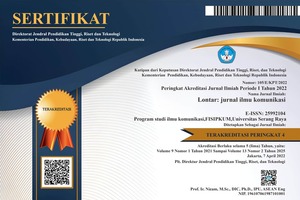Gender-based Interpersonal Communication Behavior: When Women No Longer Muted
DOI:
https://doi.org/10.30656/lontar.v13.i1.10288Keywords:
Gender Studies, gendered communication, muted group theory, assertive communicationAbstract
This is a study using interview methods, focus group discussions, and systematic literature reviews. The problem is positioned on the change in the form of communication between women in the past and present. In an environment that supports the form of communication in the passive category, contemporary women today are gradually using the assertive category, especially in the context of romantic interpersonal relationships. Previously, in this category, women were expected to behave passively. In the explanation, muted group theory, patriarchal culture, and emotional intelligence of women will also be touched on to better understand the change in the form of communication in contemporary conditions.
References
Adisa, T. A., Ogbonnaya, C., Mordi, C., Ajonbadi, H., & Adekoya, O. D. (2024). Seen but not heard: the voice of women at work and the mediating role of culture. International Journal of Human Resource Management. https://doi.org/10.1080/09585192.2024.2421345
American Psychological Association. (2021). Women and Emotional Intelligence: A Review of the Literature.
Argadinata, F. (2024). Persetujuan Perkawinan Atas Sukut (Diam) Perempuan Ketika Peminangan Dalam Pandangan Hukum Di Indonesia. AL-MIKRAJ Jurnal Studi Islam Dan Humaniora (E-ISSN 2745-4584), 5(01), 631–643. https://doi.org/10.37680/almikraj.v5i01.6140
Manian, S., & Sheth, K. (2021). Follow My Lead: Assertive Cheap Talk and the Gender Gap. Management Science, 67(11), 6880–6896.
Moller, A. C., et al. (2021). Emotional Intelligence and Its Role in Romantic Relationships: A Review of the Literature. Journal of Relationships Research, 12(1), 1-10.
Pew Research Center. (2020). The Future of Gender Equality: A Global Perspective.
Samochowiec, J., & Florack, A. (2010). Intercultural contact under uncertainty: The impact of predictability and anxiety on the willingness to interact with a member from an unknown cultural group. International Journal of Intercultural Relations, 34(5), 507–515. https://doi.org/10.1016/j.ijintrel.2010.05.003
Simon, E. (2021). The Different Language Use between Male and Female University Students. LECTIO, 1, 13–18.
Surya Saputra, D., Navira Pratiwi, R., & Wahyu Pratiwi, I. (2022). Becoming The Self Pada Perempuan yang Bercerai Becoming The Self On A Divorce Woman. Jurnal Perempuan dan Anak (JPA), 5(2), 69–79. https://doi.org/10.22219/jpa.v5i2.21933
Syawal, M. S., Dwiandini, A., Khaerunnisa, D. H., & Irwansyah, I. (2024). Exploring the Role of Muted Group Theory in Understanding Women’s Experiences: A Systematic Literature Review. International Journal of Humanity Studies (IJHS), 7(2), 279–294. https://doi.org/10.24071/ijhs.v7i2.7305
Think Cultural Health. (2025). Communication styles. https://thinkculturalhealth.hhs.gov/assets/pdfs/resource-library/communication-styles.pdf
Downloads
Published
Issue
Section
License
Copyright (c) 2025 LONTAR: Jurnal Ilmu Komunikasi

This work is licensed under a Creative Commons Attribution 4.0 International License.
By submitting an article to the journal, the author(s) agree to transfer the published article's copyright to the journal, which will act as the publisher. This means the journal will have the right to publish the article in various forms, including reprints. The journal will maintain the publishing rights to the published articles.
In line with the license, authors and third parties (readers, researchers, and others) are allowed to share and adapt the material. In addition, the material must be given appropriate credit, provided with a link to the license, and indicated if changes were made. If authors remix, transform, or build upon the material, authors must distribute their contributions under the same license as the original.





